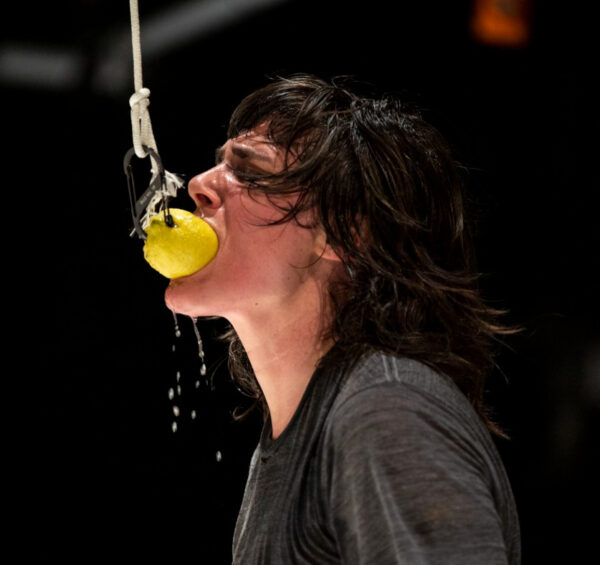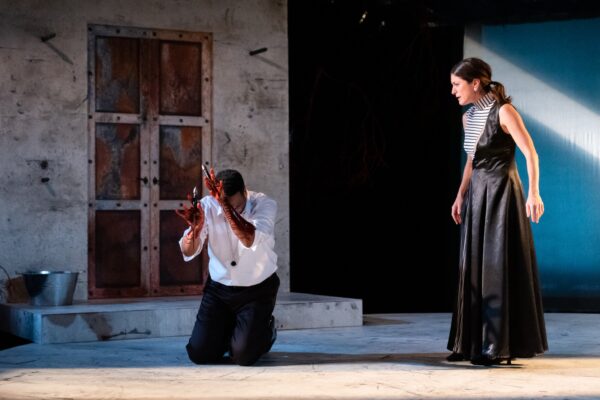Review: Coriolanus by William Shakespeare. Directed by David Quicksall. Produced by Seattle Shakespeare Company. With David Drummond, Peter A. Jacobs, Therese Diekhans and Mike Dooly. Now through January 29 at the Center House Theater at Seattle Center.
I’ll be honest. I’ve never read Shakespeare’s drama “Coriolanus” or seen a production of it. The only thing I really knew about it is that Laurence Olivier did a spectacular production of it 50 years ago that involved a dangerous and breath taking stunt during the play’s final moments. It’s not one of Shakespeare’s famous plays and it’s a war drama and to be frank, I wasn’t really looking forward to seeing it at Seattle Shakespeare Company. There’s nothing duller than a bland production of a minor Shakespeare play. (Well, there is…the recent FIVE hour adaptation of “Mildred Pierce” on HBO directed by Todd Haynes and starring Kate Winslet. I just watched it, and it was like watching pudding develop a skin on top, but I digress, as usual.)
The good news is, I didn’t nod off or make mental lists of things to do as I’m apt to do when I’m bored at the theater. Seattle Shakespeare Company’s “Coriolanus” is interesting, riveting and very timely dramatic theater. Director David Quicksall has done an excellent job of staging a quick moving production that manages to be clear and concise and cleverly compares the politics of “Coriolanus” with the current political climate in the United States. It’s enhanced by strong design work, especially for the sets, sound and lighting, and features a number of strong performances. “Coriolanus” might have an awkward title, but it’s well worth your time to check it out.
More after the Jump.
But, let’s fill you in a bit so you know what you’re getting yourself into. Caius Martius is a noble, Roman general and a fierce patrician of the highest order. He’s a military man and doesn’t have much patience with the plebian lower classes who either avoid fighting in Roman waged wars, or make poor soldiers. After winning a major battle again his arch rival, Aufidus of the Volsces, Caius Martius is honored with the tributary name Coriolanus. Now a hero to many in Rome, Coriolanus is urged by his mentor Menenius Agrippa and his ambitious mother Volumnia to run for consul. But, the plebes and their tribune leaders must approve the appointment and Coriolanus is not popular with the lower orders. The short tempered Coriolanus insults the plebes and their leaders, and in their rage they banish Coriolanus from Rome. Homeless, the great general ends up in Volsces territory where he joins forces with Aufidius, his rival but also a warrior he greatly admires. The two lead an army against Rome, with Coriolanus determined to get his revenge, but a plea from his wife, child and most importantly, his strong willed mother results in Coriolanus calling off the siege. Furious at the betrayal, Aufidius gets his revenge…
David Quicksall obviously saw the parallels between Shakespeare’s version of 5th Century BC Rome (400 years BEFORE Julius Caesar) and more contemporary events. In his director’s note printed in the program, Mr. Quicksall notes the similarities to the Occupy Wall Street movement, and the 99% but the angry, disenfranchised, fickle and frequently pedantic and gossip obsessed common men and women of ancient Rome could also be compared to the Tea Party, the hippies of the 1960’s, angry villagers in Frankenstein movies, or any mob in any society at any point in time. The mob leaders, the patrician power brokers and Coriolanus himself all have their comparable counterparts. Depending on your political or philosophical point of view, you can read ANYTHING into the characterizations and plot construction of “Coriolanus”. And, that adds to the fun and topicality of the play, (and, gives you something to discuss with your theater companions after the show is over…) And, Mr. Quicksall’s excellent pacing only enhances the clarity of this production. You don’t have to be a historian or Shakespeare scholar to figure out what’s going on here.
The director is also blessed with several actors who give strong performances. Our leading man, David Drummond is a big, strapping actor with a warrior’s build and stature and it’s smart casting from a physical standpoint but he also gives a performance that’s big when it needs to be, and quiet and focused when appropriate. Coriolanus is a tough bastard, but Mr. Drummond manages to make the character poignant and likeable as well, and he embraces the comedic moments just as powerfully as the big, bombastic ones and the tender, resigned ones.
There are two other Equity actors in this production and they both shine, especially Peter A. Jacobs as the mentor Agrippa. It’s an oily, purring, confidential performance and Mr. Jacobs revels in the scenes where Agrippa is a power player as he handles not only Coriolanus, but the plebian tribunes who stand in his way. But, Mr. Jacobs is also equally commanding in later scenes, where he is heartbroken that he has been rejected by Coriolanus and lost his political clout and position of authority. It’s excellent work and a highlight of this production.
I also very much liked Therese Diekhans as the mother Volumnia, one of Shakespeare’s greatest tough, power behind the throne women. Volumnia is a steely, grande dame of the highest order and Ms Diekhans is apparently having a fine time finding her inner “Judi Dench” as she icily commands not only her son and her family, but Roman society in general. But, one small quibble…I personally would have liked to have seen a TAD more fire along with that ice. There were a few moments where I wished that Ms Diekhans had upped the ham quotient to her performance. Personally, I LIKE a LITTLE scenery chewing, when appropriate and when it’s done by a strong actor who knows how to channel it, especially when it’s a big robust role in a big robust Shakespearian play. I’m not asking for a lot; maybe 10% more passion…a little more sneering and a couple arched eyebrows…just a hint of Siân Phillips as Livia in “I, Claudius”. That’s all. I very much liked Ms Diekhans’s performance, but I wanted to love it and our potential love affair didn’t quite consummate.
There was also strong acting from the two tribunes, the “People’s Leaders”. Both David S. Klein and Gerald B. Browning brought a convincing oiliness and false sense of outrage to these roles, as your typical political party schemers. You never believe they are actually on the side of the mob they represent; these two are expert politicians playing both ends to justify their means. And, Mike Dooly gives another powerful performance as Coriolanus’s rival Aufidius, an equally tough and charismatic leader. It’s been interesting to note Mr. Dooly’s growth as an actor over the last two years; he just gets better and better, and more powerful and commanding as an actor, especially in his work at Seattle Shakes, and methinks it is time Seattle Shakes gives him a true leading role. I think he’s earned it.
Quick note on the design for this show. I really liked the set, using moving panels to suggest the multiple locations in the play, designed by Carol Wolfe Clay. Pete Rush’s contemporary clothes were also a big plus, with each character and each character’s role in the play, and the society they represent very clearly defined. Kent Cubbage did a great job with the at times very dramatic lighting design. AND, I really loved the sound and music design from veteran musician Nathan Wade who was apparently lured back to the theater stage for this production. The music and sound for this production enhance it and raise it to appropriately majestic levels.
Yes, I very much liked this production and have to note this is the second year in a row that the Shakes has staged an excellent production of a lesser known Shakespearian work in the difficult slot between their big fall and spring productions. Last year’s “Chamber Cymbeline” was quite good, and this year’s “Coriolanus” is also a welcome winter time treat. It’s a provocative, timely and richly produced production that deserves to be seen.




















